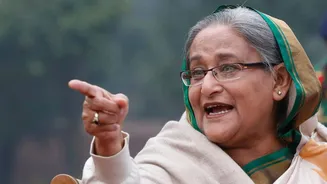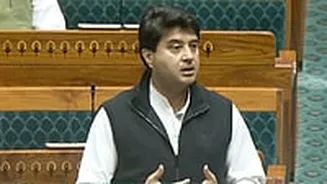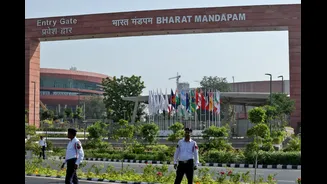Hours ahead of the International Crimes Tribunal ruling, Bangladesh's former Prime Minister Sheikh Hasina, who was ousted following deadly protests last
year, broke her silence on her future plans and the current situation in her country in an exclusive interview with Times Now on Sunday. Hasina indicated that she may seek a political return, saying her future "depends not on my wishes but on the political climate in Bangladesh." Hasina, who fled to India on August 5, 2024, following widespread anti-government protests, has insisted that any comeback will be determined by whether the country can hold "free, fair, and participatory elections" in which "all major parties, including the Awami League, have the right to contest." She added that in such a scenario, "the people will decide the future."
Her comments come as she, former home minister Asaduzzaman Khan Kamal, and former inspector general of police Chowdhury Abdullah Al-Mamun face charges before the tribunal, including allegations of murder, attempted murder, torture and other inhumane acts linked to last year's protests. The unrest stemmed from opposition to a controversial quota system in government jobs.
Also Read | 'Living Freely in Delhi, But...': Ousted Bangladesh PM Sheikh Hasina On Life In India
Hasina, who ruled for more than 15 years and remains one of South Asia's longest-serving leaders, argued that her departure was not the result of political fatigue but of a coordinated effort to destabilise her government. She said the 2024 student movement had been "exploited by violent individuals who had no interest in reform and every interest in creating chaos," pointing to "outside provocateurs," "military-grade weapons in civilian hands" and the "coordinated burning of state institutions."
According to Hasina, staying in Dhaka would have risked "a bloodbath." She said she stepped aside "because the safety of the country had to come first."
Criticism of the Yunus Government
The former prime minister sharply criticised the interim administration now led by Muhammad Yunus, accusing it of lacking legitimacy and fuelling instability.
"Bangladesh was plunged into a state of turmoil and lawlessness the moment an unelected regime seized power and ruled through fear, rather than consent," she said. She warned that attacks on minorities, the "dismantling of the constitution," and the release of individuals "linked to extremist organisations" were predictable consequences of a government that "has no electoral legitimacy."
Hasina argued that order can be restored only when "the political rights of the electorate" are reinstated. "Without that, any stability will only be temporary," she added.
Relationship with India
Hasina, currently in India, described New Delhi as "a steadfast friend to Bangladesh," adding she was "deeply grateful to the Indian people for welcoming me."
Responding to questions over whether India's muted posture during her final months in office emboldened her opponents, she said the turmoil was "a direct product of the plans orchestrated by my political opponents to capitalise on legitimate civil protest and seize power by unconstitutional means." She said the crisis "could not have been foreseen."
Future of the Awami League
Despite her absence, Hasina insisted the Awami League is capable of enduring without her. "It is not a family enterprise; it is a political movement rooted in the country's independence," she said, noting that there is "no shortage of capable leaders within the party." What the party needs, she added, is the ability to operate freely and contest credible elections.
Reflecting on her long tenure, Hasina said stability in Bangladesh "must be built carefully" and argued that accusations of heavy-handed governance were driven by political opponents who are "ruling without a mandate."
Concerns over Pakistan outreach
Hasina also criticised recent engagement between Pakistan and the interim administration, including military-level contact, calling it "a desperate bid by an unelected regime seeking validation abroad."
She stressed that under her leadership, Bangladesh followed the principle of "Friendship to all, malice toward none," but said the current approach marks a shift. She accused Muhammad Yunus of being "eager to rewrite that history and court Islamabad," despite Pakistan having "never acknowledged or apologised for the atrocities of 1971."
Hasina argued that the interim government lacks the legitimacy to "reshape Bangladesh's foreign policy" and claimed its members include individuals seeking to "roll back our secular and independent foundations."
Once democracy is restored, she said, Bangladesh's foreign relations will "again reflect Bangladesh's real interests, not the ideological ambitions of those clinging to power."
















